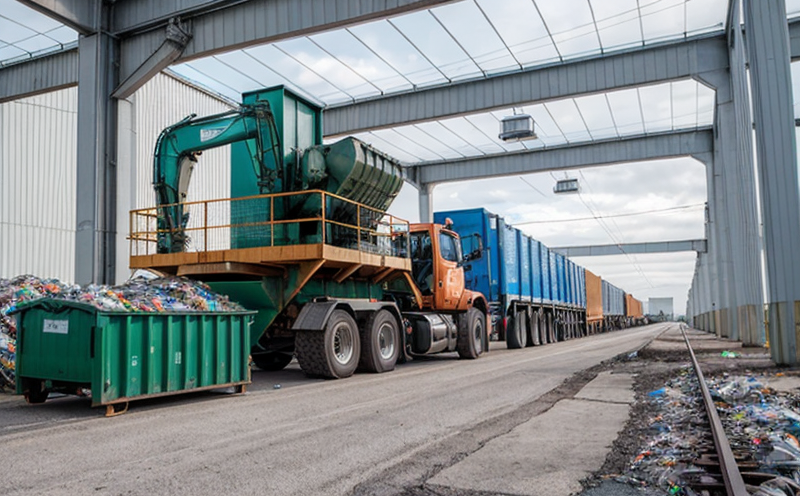ASTM D8179 Copper Recycling Quality Testing
The ASTM D8179 standard is a critical tool in the industrial manufacturing sector, particularly within the realm of copper recycling. This test method provides a standardized approach to evaluating the quality parameters of recycled copper materials, ensuring that products meet stringent purity and performance criteria. Copper recycling plays an essential role in sustainable resource management by reducing waste and decreasing reliance on virgin raw materials.
The ASTM D8179 process involves several key steps to assess the quality of recycled copper. Specimens are first prepared according to specified dimensions, which ensures uniformity across samples for accurate testing. The testing itself can include a range of chemical analyses aimed at verifying that the recycled copper does not contain excessive impurities such as lead, nickel, zinc, or other metals that could compromise product integrity.
The most critical aspect of ASTM D8179 testing is its emphasis on the precise measurement of copper content. This is achieved through advanced analytical techniques like inductively coupled plasma optical emission spectrometry (ICPOES) and inductively coupled plasma mass spectrometry (ICPMS). These methods offer high precision, allowing laboratories to detect even trace amounts of impurities that might otherwise go undetected by simpler testing protocols. The test also evaluates the mechanical properties of the recycled copper, including tensile strength and elongation, which are crucial for ensuring that the material can withstand various manufacturing processes without degradation.
By adhering to ASTM D8179 standards, industrial manufacturers and processors gain assurance that their recycled copper products meet rigorous quality benchmarks. This is particularly important in industries where product integrity and performance are paramount, such as electronics, construction, and automotive sectors. Compliance with these standards not only enhances brand reputation but also facilitates smoother supply chain management by ensuring consistent material quality.
The impact of ASTM D8179 extends beyond just the copper recycling industry; it contributes to broader sustainability goals. By promoting efficient use of resources and reducing environmental footprints, this standard supports the circular economy model, which aims to minimize waste and maximize resource recovery. This approach aligns with global initiatives aimed at fostering a more sustainable future.
In summary, ASTM D8179 is indispensable for any organization involved in copper recycling or processing. Its comprehensive testing protocols ensure that recycled materials are of high quality, thereby supporting both industrial efficiency and environmental stewardship.
Benefits
The implementation of ASTM D8179 Copper Recycling Quality Testing brings numerous benefits to the industrial sector:
Elevates product quality through rigorous testing, ensuring that recycled copper meets stringent purity and performance standards.
Enhances brand reputation by demonstrating commitment to sustainability and compliance with international standards.
Fosters smoother supply chain management by providing consistent material quality across batches.
Promotes efficient use of resources, reducing the need for virgin raw materials and minimizing waste.
Supports global sustainability goals by aligning with initiatives aimed at fostering a more sustainable future.
Facilitates compliance with international regulations and standards, ensuring that products meet stringent environmental criteria.
Provides confidence in the reliability of recycled copper, which is critical for industries reliant on high-performance materials.
Paves the way for innovation by enabling continuous improvement in recycling processes through detailed analytical insights.
Eurolab Advantages
EuroLab stands out as a leading provider of ASTM D8179 Copper Recycling Quality Testing, offering several advantages:
Expertise in international standards: Our team is well-versed in the latest ASTM and ISO standards for copper recycling.
State-of-the-art laboratories: Equipped with advanced analytical instruments such as ICPOES and ICPMS to ensure precise measurements.
Comprehensive testing services: We cover all aspects of copper quality assessment, from chemical composition to mechanical properties.
Dedicated customer support: Our team is always available to guide you through the testing process and interpret results accurately.
Fast turnaround times: We understand the importance of timely results in maintaining efficient supply chains.
Confidentiality guarantees: Your data remains protected, ensuring that sensitive information is handled securely.
Continuous quality assurance: Our laboratories undergo regular calibration and certification to maintain high standards.
International recognition: EuroLab’s testing results are widely accepted across various countries and industries.
International Acceptance and Recognition
The ASTM D8179 standard is internationally recognized for its reliability and accuracy in assessing recycled copper quality. Its acceptance spans numerous sectors, including electronics, construction, automotive manufacturing, and more. This widespread recognition underscores the significance of adhering to such standards:
Electronics Industry: Recycled copper is a key component in printed circuit boards (PCBs) and other electronic devices.
Construction Sector: Copper is used extensively in wiring, plumbing systems, and roofing materials.
Automotive Manufacturing: From engine components to vehicle interiors, recycled copper plays a vital role.
Manufacturing and Processing: Ensuring the quality of recycled copper enhances product performance across various manufacturing processes.
The ASTM D8179 standard ensures that recycled copper meets the stringent requirements set by these industries. By upholding this standard, manufacturers can ensure that their products are not only high-quality but also compliant with international regulations and standards.





